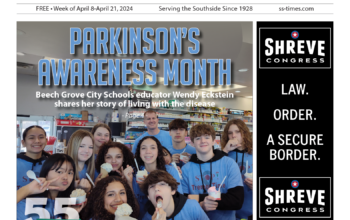By Wendell Fowler
I nearly overlooked heart month. Maybe because I never, ever, want be that messed up and disconnected again! Thirty years have passed since I was bluntly informed, “Get prepared, Mr. Fowler; you are going to die!”
To disappoint a drooling Grim Reaper, I reached deep inside and found my power. I chose not to die … then, at least. Despite its inevitability, the proposition of death opens one’s eyes, which some of you above ground may have already experienced.
The American Heart Journal reports only 25 percent of heart attacks are caused by high cholesterol. Most scientists agree: it’s not just low-density lipoprotein that’s the forecaster. Death by heart disease is brought on by chronic inflammation caused by regularly eating simple carbs, sugar and the galaxies of food additives simmered in vitamin deficiency, sloth, lack of sleep, stress, environment and lack of a fibrous plant-based diet.
Harvard Medical School suggests a C-reactive protein (CRP) test: a special type of test to discover if you have an increased chance of a sudden heart attack. Inflammation can damage the inner lining of your arteries and make cardiovascular disease more likely. Over a dozen major studies demonstrate baseline levels of CRP in apparently healthy men and women are highly predictive of future risk of heart attack, stroke, sudden cardiac death and the development of peripheral arterial disease (Circulation journal).
Preventing CVD requires far more than lowering cholesterol levels. In fact, 50 percent of the people hospitalized with heart attacks have normal cholesterol levels, and 25 percent of people who develop premature heart disease have no traditional risk factors at all.
Brigham Young researchers explain immune system cells that cause inflammation burrow into your artery wall, gobbling up droplets of the fats you eat. These fat-filled cells form a plaque and inflammation thins the cap. Eventually, the cap ruptures, and the plaques contents spill into your blood stream, encourages clotting. Suddenly, your artery fills with a cloud of rapidly coagulating blood cells. If the clot is large enough, thud, call 911!
FDA’s Office of Surveillance and Epidemiology and Office of New Drugs requires warning labels for statins as they may increase risk of liver damage, memory loss and confusion and Type 2 diabetes and muscle weakness (for certain statins). Statins deplete Coenzyme Q10, which can lead to heart failure.
Other than loving yourself, your primary goal for CVD prevention: eat a plant-food diet, exercise, keep inflammation to a minimum and be happy.


